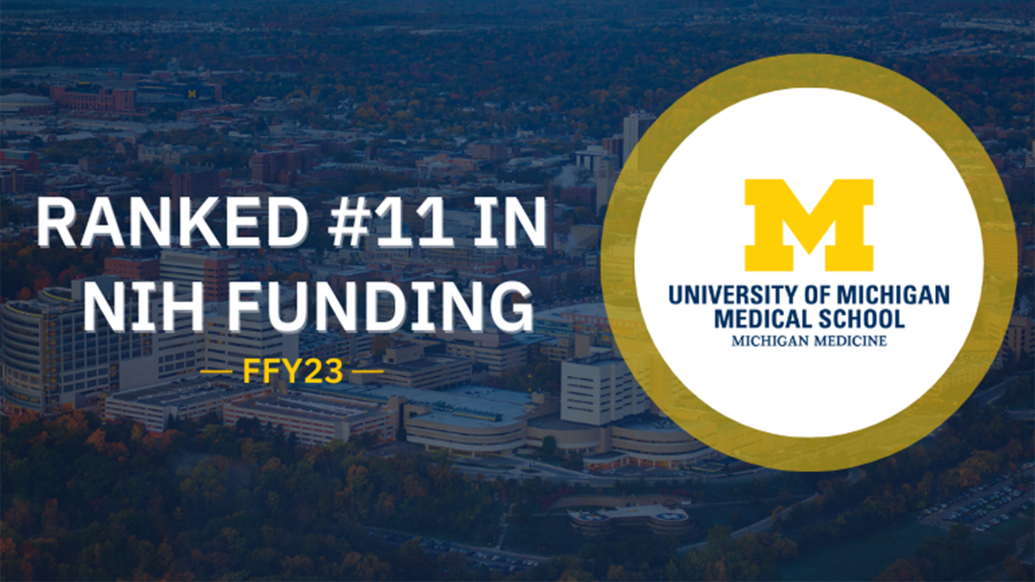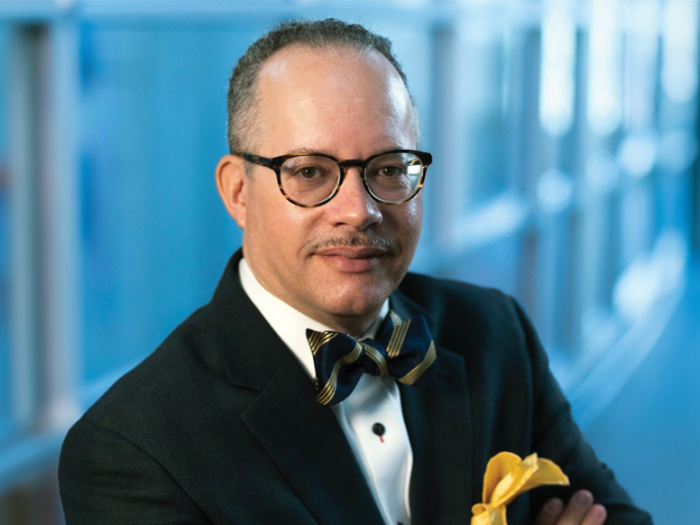4:30 PM
Author |

In a highly competitive field, Michigan Medicine once again rises to the top. Based on recent federal fiscal year data released by the National Institutes of Health (NIH), the largest single funder of biomedical research in the world, the U-M Medical School is ranked number 11 in the country, up from 13 in federal fiscal year 2022.
The Medical School’s total market share increased to 2.68% (up from 2.47%) and current NIH funding amounts to $482.8 million, an almost 11% increase over the previous fiscal year.
Overall, the Medical School received $777.3M in total awards from all sources in FY23.
“Michigan Medicine remains totally committed to advancing our basic science and clinical research. With the support of the NIH and other funding sources, our incredible faculty and teams will lead the future of health care and biomedical research,” said Marschall S. Runge, CEO, Michigan Medicine and Dean, U-M Medical School.
At the unit level, 70% of departments saw positive growth in funding, and more than half also had a positive change in their NIH ranking. Two departments, Physiology and Urology, are ranked first in the nation, with four more (Biomedical Engineering, Emergency Medicine, Physical Medicine and Rehabilitation, Surgery) ranked in the top five. Overall, 21 departments are ranked in the top 15 tier, with 17 ranking in the top 10.
Funding from the NIH makes up the majority of research dollars flowing into academic medical centers in the U.S. Some of the projects reflected in the Medical School’s positive performance include the $71 million Clinical and Translational Science Award supporting the Michigan Institute for Clinical & Health Research (MICHR); a collaborative effort to understand the mechanisms behind kidney disease; funding to support diabetes research, depression treatment and more. Overall, the NIH awarded 933 grants to faculty within the Medical School in federal fiscal year 2023, alone.
In addition to a strong performance in NIH award dollars, the Medical School is continuing to demonstrate consistent expenditure growth across all sponsors as UFY23 had 7.27% increase over UFY22, as researchers put these funds into action. The Medical School accounts for 43% of U-M’s research expenditures.
And while funds from the NIH are a primary source, research at the Medical School is also supported by more than $100 million in awards from non-profits and more than $155 million in industry-sponsored awards. In total, the Medical School received $777.3 million total awards in the university’s fiscal year 2023.
As a result of this investment, many of these projects are leading to potential innovative therapies, moving through the technology transfer process into commercialization. For example, there were 249 invention reports in U-M fiscal year 2023.
“We owe our ability to attract NIH funding to the dedicated and innovative biomedical research community here at the Medical School. The work of these great minds continues to improve our standing as one of the top research institutions in the nation and allows us to attract the critical collaborations and talent that will lead to great discoveries now and in the future,” said Steven Kunkel, Ph.D., Executive Vice Dean for Research, U-M Medical School and Chief Scientific Officer, Michigan Medicine.
NIH rankings for departments are generated from publicly available data and determined as a percent of the total funding available to medical schools. The full data set published by the NIH is available in the NIH RePORTER: https://reporter.nih.gov/
Medical school rankings for NIH fiscal year 2023 were also recently compiled by the independent Blue Ridge Institute for Medical Research, which uses a different methodology and placed U-M at number 12.





